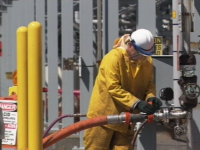Asian markets tumble again on Yen carry-trade woes
The global decline, which wiped out $1trillion in market value last week, continues unabated. Rex Mathew reports.
Markets across Asia have extended their losses from last week on heavy unwinding in Yen carry-trades. Malaysia has lost over 4.5 per cent today while Singapore is down 4 per cent. Japan has slipped 3.5 per cent while the Shanghai index in China, which saw an 8.8 per cent crash last Tuesday, has lost nearly 3 per cent. Hong Kong is down 3 per cent while South Korea and Indonesia have lost over 2.5 per cent each.
Japanese investors exploit the low domestic interest rates to borrow locally in Yen and invest them proceeds in better yielding securities abroad. Such transactions are called Yen carry-trades and the total volume of such transactions is estimated at around $200 billion.
These trades become non-profitable when the Japanese Yen appreciates against other global currencies and when domestic Japanese interest rates rise. Japan had doubled its overnight lending rate from 0.25 per cent to 0.50 per cent on 21 February. (See: Bank of Japan doubles interest rate to 0.5 per cent)
The Japanese Yen appreciated 3.7 per cent against the US Dollar and 3.5 per cent against the Euro last week. This triggered an unwinding of the carry trades by Japanese investors and the process is continuing today as well. Though exact estimates are not available, it is likely that part of the Japanese investments in Indian equities is in fact carry trades.
Rising Yen would affect the earnings of large Japanese companies, which rely heavily on exports. There is also the possibility that other regional currencies would also rise in tandem against the US Dollar and the Euro, which would affect Asian exports. This comes at a time when there are widespread fears of a further slow down in the US, the main market for Asian exports.
Last week, the Morgan Stanley Capital International (MSCI) World Index, which tracks major global markets, slipped 4.5 per cent. This was the worst weekly decline in more than four years and came after rising concerns about a recession in the US economy apart from Yen carry-trade unwinding. Last week's global sell-off is estimated to have wiped off a staggering $1.5 trillion in market value.
Fears of a US recession had led to a 4.2-per cent fall in the Dow Jones index last week. The S&P 500 index lost 4.4 per cent while the NASDAQ index, dominated by technology stocks, slipped 5.9 per cent. MSCI Asia Pacific index lost 3.5 per cent last week while the MSCI emerging markets index tumbled 6.7 per cent.
European markets also saw their worst decline in more than 4 years last week. Major European indices dropped an average 5.5 per cent last week. Germany's Daxx index slipped 5.6 per cent, France's CAC gave up 5.1 per cent and the FTSE in London declined 4.5 per cent last week.
In India, the Sensex and the Nifty gave up over 5 per cent each last week - for the second consecutive week. In morning trades today, the Sensex dropped over 500 points while the Nifty slipped more than 150 points
last week - for the second consecutive week. In morning trades today, the Sensex dropped over 500 points while the Nifty slipped more than 150 points


